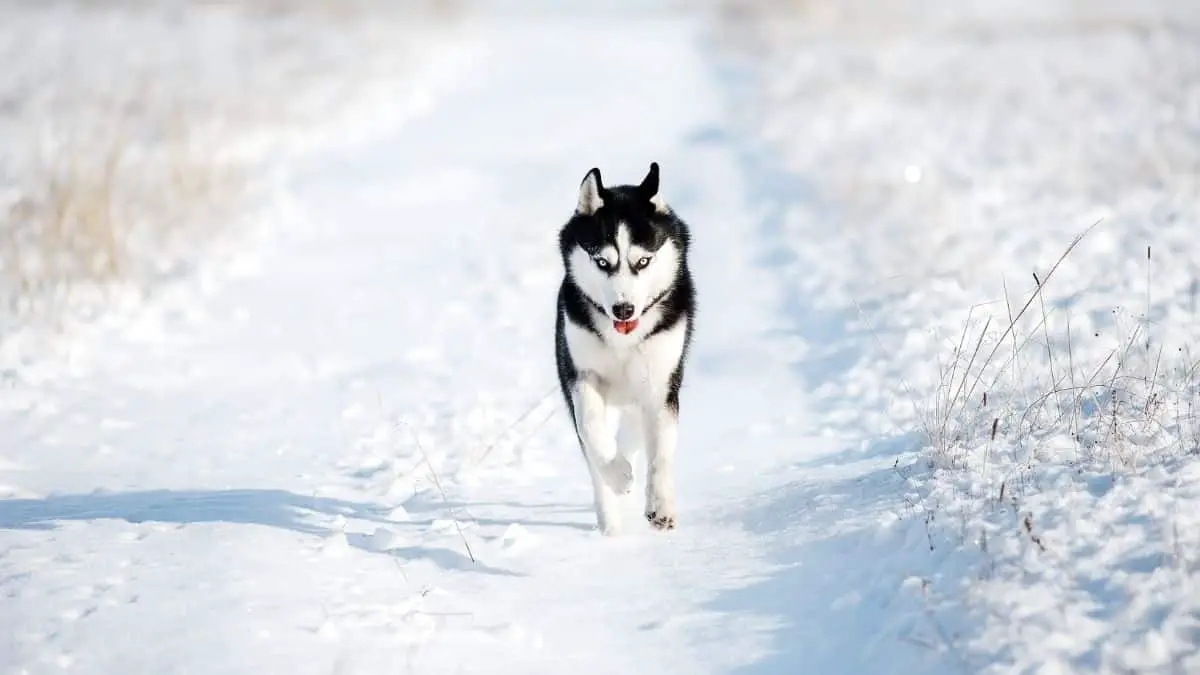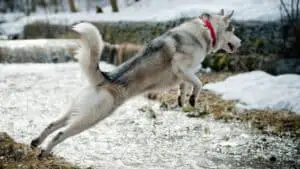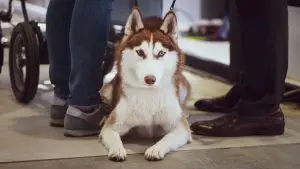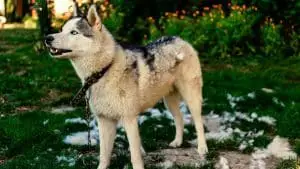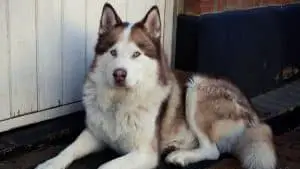Husky Obedience Training & Advice: 3 Things You Need To Know (+FAQ)
Every dog owner lives in dread of their furry friend turning into a disobedient monster! A disobedient dog can make their owner’s life much more difficult and much more embarrassing than it needs to be. Whether you’re trying to get your pooch to sit and stay or want to teach him more advanced commands, the natural obedience of your dog can often make or break your success with these endeavors.
Many people will tell you that obedience is a major issue when it comes to Siberian Huskies. Much of this reputation stems from this breed’s high intelligence levels – often, they do not need to be told what to do. Rather they will just do what they think is right! Huskies are also independent dogs and like to be dominant. They are the kind of dog that, when given an inch, take a mile. So, if you let your Husky get away with naughty or disobedient acts, he will take that as your tacit approval of his disobedience and will continue to act in this way!
By familiarizing yourself with some of your Husky’s key character traits and brushing up on training techniques and etiquette, you can turn your Husky’s natural intelligence and independence to your advantage. After all, these two things also make Huskies fast learners!
Table of Contents
The major issue with Siberian Husky obedience
One of the major issues when it comes to Huskies is their tendency to run away and their tendency to escape, even if you try to stop them. It is not that they hate you and want to run as far away from you as possible. They just have an inbuilt desire to run. To run, they must set themselves free.
Even when Huskies are enclosed, they will find a way to get out and run free. They have a strong reputation as escape artists, with some exasperated owners even referring to them as Houdini dogs!
Huskies will go to great lengths to escape and run free. They can chew through your fence, climb or leap over it, or even dig under just to escape the confinement of your yard. These intelligent dogs can even figure out latches!
Obedience classes do not affect whatsoever their desire to run, as this desire is inbuilt. In this case, it is best to have a secure fence in place and ensure you are getting your Husky plenty of exercise (on a strong leash, of course!).
Naturally disobedient?
It is natural for a Siberian Husky to be independent, but they also thrive on companionship, particularly of other dogs – after all, they are pack dogs at heart! This means they are not strictly dependent on humans for love and affection, which can manifest in your Husky tending to disregard what humans tell them.
Siberian Husky obedience is also countered by the fact that they are structured to think that the world revolves around them. They believe everything is about them and that you exist only to take care of them and attend to their every need. That you should feed him, your bed is his bed, and every toy in the house is his toy. This can be an attitude that is hard to break. In particular, this attitude can make Siberian Husky obedience training very frustrating as often your dog does not want to accept the rules and restrictions imposed by others!
As much as the Siberian Huskies do poorly in obedience, they excel in other feats that involve physical strength, such as agility. Once you put them on a sled, their natural desire to run kicks in, and they start pulling. Most Siberian Husky agility competitions are customized to involve sleds, and they perform very well.
What to know about Siberian Husky Obedience Training?
Having an obedient and attentive Siberian Husky is not impossible. Understand that it is in his nature, and he is not just trying to spite you. If it seems like Siyour obedience training is so frustrating that you simply run out of patience, it may be a good idea to leave obedience training to skilled professionals. While Siberian Huskies may have an open disregard for boundaries, a good trainer will know how to establish boundaries with your Husky.
Frequently Asked Questions
Can Huskies be obedient?
While they have a reputation as difficult to train dogs, Huskies can indeed be very obedient. After all, they were originally bred as sled dogs, intended to pull heavy loads over long distances across ice and snow.
Huskies are very intelligent and will respond well to the right type of training. This means you will need to use lots of positive reinforcement, whether you are teaching basic commands, crate training, or aiming for more complex commands.
Your Husky will quickly learn when they are getting a good deal and getting a bad one! This is where their natural independence will come into play, and they ignore their owners. Ensure you have plenty of tasty treats on hand when you are embarking on this process and have practiced your very best voice for praise!
Are Huskies really that hard to train?
Husky dogs’ natural independence means they have earned a reputation as a breed of dog that is difficult to train. While it might not be advisable for first-time dog owners to dive into the deep end and bring home a Husky, it would not be difficult for an experienced dog owner to train a Husky.
As most Husky owners will tell you, an effective regime for your Husky requires consistency, patience, and lots of treats! Training puppies is much easier than older dogs, as you won’t have any ingrained bad behaviors to overcome.
Start small, with simple one-word commands and short, simple sessions. You will soon notice improvements in behavior. If you remain consistent with your commands and methods, you will find your intelligent, independent Husky is just as easy to train as most other dogs!
How do you discipline a Siberian Husky?
It’s important to remember that our common understanding of punishment or discipline will not work on your Husky unless you actually catch them in the act of the unwanted behavior. If you come home to a chewed up shoe or an overturned garbage can, it is worthwhile letting your Husky know you are upset, but punishing them will not be effective as they will not necessarily associate their past behavior with your mood.
If you do catch them in the critical period of time, however, there are a couple of ways you can discipline your Husky in a manner that will engender understanding and (hopefully!) future good behavior.
A few key tips when disciplining your Husky:
- Use a low, firm tone when reprimanding your dog – a simple ‘no’ or ‘bad’ often suffices.
- Do not use physical violence – your dog will just start exhibiting the bad behavior behind your back!
- Use your Husky’s name before issuing the reprimand – you’ll find they are paying much greater attention, and your actions will be much more effective.
- Praise and reward your Husky when he stops the naughty behavior – just as you were stern while he was acting up, so too should you be warm and happy when he behaves well!
Are Huskies well behaved?
Siberian Huskies are generally regarded as terrible guard dogs. Why? Because they are just so friendly! Even from the time they are puppies, these dogs have a natural curiosity and friendliness that will lead them to treat perfect strangers like the best of friends!
As well as being bred as working dogs, Siberian Huskies were also originally intended to be companion animals, often welcomed into family tents on cold, dark Siberian nights. Every Husky owner will tell you – this instinct remains strong in these dogs, even today!
In fact, the only issue you may encounter with your Husky’s behavior is a bit of a cheeky, independent streak. This can be effectively managed, however, with the proper training methods.
When should I start training my Siberian Husky?
As you might expect, Husky puppies are much easier to train than older dogs. This is for a number of reasons. For one, Husky puppies do not have any long term bad behaviors that need to be trained out of them, unlike some older dogs.
Husky puppies are also much more likely to look up to you as a leader, especially if you have had them from a young age. Huskies, after all, are pack animals and will tend to follow the commands of their leader.
So with all this in mind, when should you start training your Husky? Ideally, as soon as possible! You can start training Husky puppies in your care from the age of about 8 weeks. This being said, it is never too late to start any type of training, but you will make life easier for yourself the earlier you begin.
Should I get professional training for my Husky?
Taking on any dog is a commitment that needs to be taken seriously. It will require a significant investment of your time, effort, and money to keep your pup happy in your house. Training is a big part of this commitment. During some of the initial stages of training, your ability to work with your Husky on a regular, constant basis will be critical to their development.
That being said, you can always seek the assistance and advice of professional dog trainers if you want to educate yourself on some key tips and tricks or if you have a particularly stubborn dog. Professional training is often useful for older foster dogs that may need a boost in their training regime.
Is it possible to train an adult dog?
The old saying about teaching old dogs new tricks is completely wrong – it is indeed possible to train a dog of any age, but you may need to invest more time, effort, and patience if dealing with an older dog. They may have picked up some bad habits that will need to be trained out of them.
Going for a couple of professional training sessions can be particularly helpful for persons with older pups. A professional can help you lay down some basic training principles and give you some key advice on how to handle your older dog.
Although older dogs are typically regarded as harder to train, there may be one surprising area where you have less of a tough time than if you were training a puppy. Potty training can actually be easier in older dogs as they can hold their bladder for longer, meaning that there are likely to be fewer inadvertent accidents in your home!
Siberian husky obedience is a major issue with this breed. This is because the dog is intelligent and does not need to be told what to do; rather he does what he thinks. He is a very independent dog and likes to be dominant. He is the kind of dog that when given an inch, takes a mile. So if you let him get away with disobedience he will take that to be approval of his disobedience and will get very stubborn.

